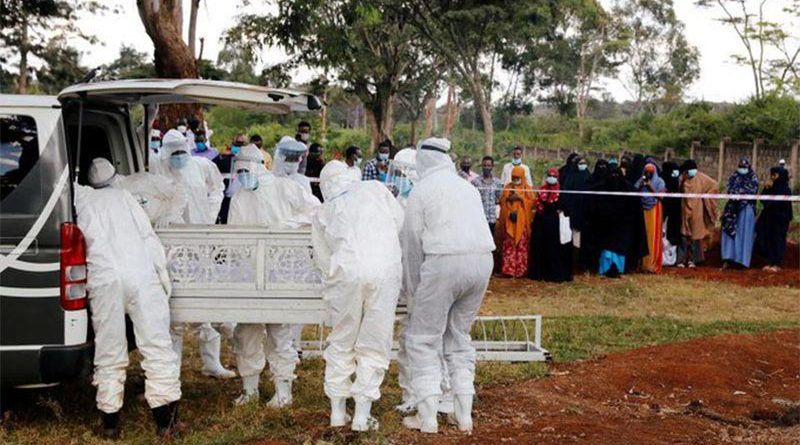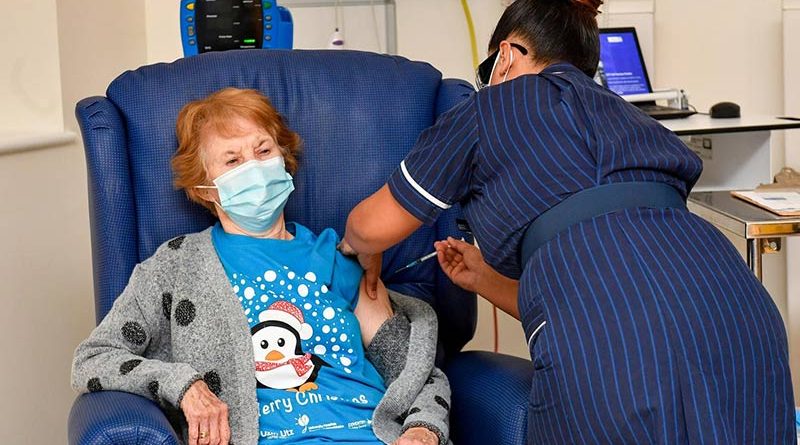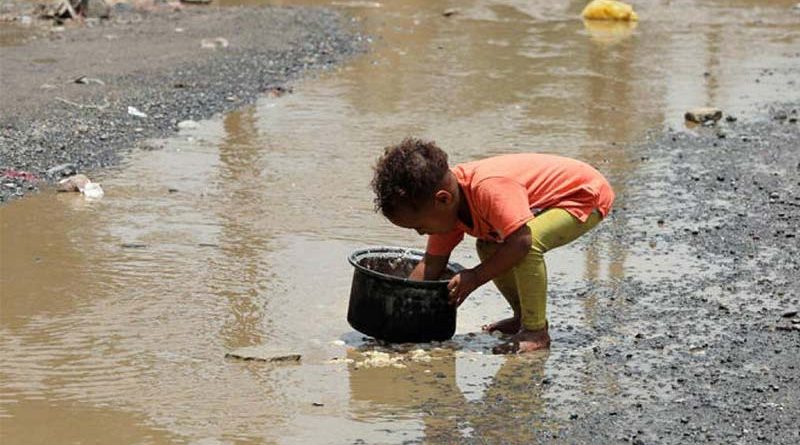THE recent deaths from COVID-19 in Kenya of a refugee, a member of parliament and a retired civil servant all happened for the same reason: emergency help was hours away.
Nearly three quarters of Kenya’s intensive care unit (ICU) beds are in the two largest cities, Nairobi and Mombasa.
Yet the new coronavirus is spreading into rural areas where the public health system is creaking and scarce ICU units are full and turning patients away, medics round the nation told Reuters.
Christmas travel may worsen the problem – and not just in Kenya.
“That is our biggest fear now,” said John Nkengasong, head of the Africa Centres for Disease Control and Prevention, a branch of the African Union bloc.
“During the holiday season, there will be a tendency for large movement from capital cities to villages, remote areas, for people to connect with families. That might drive the pandemic,” he told a news conference from Ethiopia this week.
Africa is recording 10,000-12,000 cases daily, moving toward a July peak of 14,000, after most governments eased lockdowns that curbed the disease but decimated jobs.
After measures were softened, Kenya had record daily cases and deaths in November, taking the totals to nearly 90,000 infections and 1,500 fatalities https://graphics.reuters.com/world-coronavirus-tracker-and-maps/countries-and-territories/kenya.
Experts say the real tally is much higher due to inadequate testing and a policy of only counting hospital deaths.
One of those was Justus Murunga, a member of parliament who died on Nov. 14 after developing breathing problems on a visit to his rural home in the Kagamega area of rural west Kenya.
When he arrived at the nearest public hospital, he was turned away because there was no oxygen.
At a private hospital, a 20-minute drive further, medics could not resuscitate him, the Nation newspaper reported.
“Had our hospital been well equipped, our brother could have been saved,” his brother Henry Washiswa was quoted as saying.
AIRLIFTS FOR POLITICIANS?
Fellow legislators suggested creating a helicopter service for politicians, drawing outrage on social media.
Kenya’s 51 million people have only 537 ICU beds and 256 ventilators, according to a July 2020 study.
“We will have a high mortality rate in the rural areas,” Chibanzi Mwachonda, secretary-general of the Kenya Medical Practitioners, Pharmacists and Dentists Union, told Reuters.
“Ambulances don’t have fuel, there’s a lack of reagents for testing, contract tracing is weak and referral hospitals are overburdened,” added Mwachonda, whose union is threatening to strike.
The health ministry did not respond to requests for interviews.
In the Kakuma refugee camp in Kenya’s remote north west, ICU care is a nine-hour drive away.
That has led to six COVID-19 deaths in a camp clinic due to lack of equipment like a ventilator, a doctor there told Reuters. A 40-year-old South Sudanese woman was the latest.
In the Indian Ocean coastal county of Kilifi, critical patients are referred to ICU wards in Kwale, two hours by ferry, or Mombasa, a one-hour drive away.
The county’s chief health officer Charles Dadu Karisa recounted the case of a former government employee in his 50s who died shortly after being sent to Mombasa. “The patient may have survived if we had our own ICU facilities,” he said.
Even in Mombasa, though, ICU wards at both the biggest public and private hospitals have been full since early November.
“We have no more space,” said a doctor at The Mombasa Hospital, the largest private health facility on Kenya’s coast, lamenting that patients had died at home after being refused admission. “What do we do?”
Source – Thomson Reuters Foundation.
MARGARET Keenan, a 90-year-old grandmother from Northern Ireland, today became the first person in the world to receive the Pfizer COVID-19 vaccine shot outside of a trial as Britain began vaccinating its population.
An early riser, Keenan received the Pfizer-BioNTech vaccine at her local hospital in Coventry, central England, on Tuesday morning at 0631 GMT, a week before she turns 91.
A video showed Keenan being pushed in a wheelchair out of the ward while nursing staff clad in protective gear lined the corridor to applaud and cheer, in an echo of moving video clips released through the year when COVID-19 survivors finally left the hospital.
Britain is the first Western country to start immunising its general population in what has been hailed as a decisive watershed in defeating the coronavirus.
“I feel so privileged to be the first person vaccinated against COVID-19,” said Keenan, as she received the shot from a nurse originally from the Philippines in front of a photographer and TV crew.
“It’s the best early birthday present I could wish for because it means I can finally look forward to spending time with my family and friends in the New Year after being on my own for most of the year.”
Keenan, known as Maggie to her friends, is a former jewellery shop assistant who only retired four years ago. She has a daughter, a son and four grandchildren.
Video footage showed her wearing a light blue mask, a grey cardigan along with a blue t-shirt with a penguin in snow and the message “Merry Christmas” as she received the shot in her left arm from nurse May Parsons.
“WE WILL BEAT THIS TOGETHER”
Parsons, one of many thousands of people from around the world employed in Britain’s National Health Service (NHS), where she has worked for 24 years, said the last few months had been tough, but there was now light at the end of the tunnel.
Britain is the worst-hit European country from COVID-19, with over 61,000 deaths. Prime Minister Boris Johnson hopes to turn the tide against the disease by rolling out the Pfizer/BioNTech vaccine before the United States or European Union.
The mass inoculation will fuel hope the world may be turning a corner in the fight against a pandemic that has crushed economies and killed more than 1.5 million, although ultra-cold storage and tricky logistics will limit its use for now.
“Thank you to our NHS, to all of the scientists who worked so hard to develop this vaccine, to all the volunteers – and to everyone who has been following the rules to protect others,” Johnson said on Twitter.
“We will beat this together.”
British Health Secretary Matt Hancock and Stephen Powis, medical director for NHS England, said they both found it very emotional watching the vaccine programme rollout.
The BBC said the second patient to receive the jab in Britain was a man named William Shakespeare from Warwickshire.
Britain has ordered 40 million doses of the Pfizer/BioNTech shot. As each person requires two doses, that is enough to vaccinate 20 million people in the country of 67 million.
About 800,000 doses are expected to be available within the first week, with care home residents and carers, the over-80s and some health service workers the top priority to get them.
Source – Thomson Reuters Foundation.
SOUTH Africa has urged school students who attended a series of end-of-year “Rage” parties to enter 10 days of quarantine after identifying four such parties as COVID-19 “super-spreader events”.
South Africa is experiencing a resurgence of new cases in the Western Cape and Eastern Cape, with President Cyril Ramaphosa on Thursday announcing new restrictions in the Eastern Cape but stopping short of a wider crackdown.
Hosted annually, the Rage parties are popular with thousands of school leavers eager to let their hair down at events that can last several days.

“We confirm that we have now identified a number of COVID-19 confirmed cases arising from these super-spreader events,” Health Minister Zweli Mkhize said in a statement.
“We now urge all the Rage attendees to immediately go into a 10-days quarantine… We also urge that Rage attendees test for COVID-19.”
Organisers of the Rage parties did not immediately respond to an emailed message for comment.
In media reports leading up to the events, organisers said they were working to ensure safety, with fewer people than normally expected to attend.
South Africa has recorded more than 800,000 coronavirus infections and more than 21,000 deaths related to COVID-19, the most in Africa.
Source – Thomson Reuters Foundation.
COVID-19 could push a billion people – almost one in nine of the earth’s inhabitants – into extreme poverty by 2030.
The alarming statistic laid out in a United Nations report this week is the latest warning of the generational impact the pandemic is having on the world’s most vulnerable.
How did the coronavirus unleash an economic storm risking so many livelihoods and what can be done to shield those most at risk?
What is extreme poverty?
Anyone living on less than $1.90 per day is defined as being in extreme poverty by the World Bank, which says the sum is the minimum needed to meet basic needs.
Has the world advanced on poverty?
Extreme poverty rates steadily dropped from more than 40% of the world’s population in 1981 down to less than 10% by 2017, World Bank data shows, largely driven by progress in China and other East Asian nations.
Five years ago world leaders pledged to eradicate it entirely by 2030 under an ambitious set of development goals.
But the coronavirus is thought to have brought the first reversal in progress in more than 20 years, as the pandemic batters world economies.
Why is the coronavirus undoing progress?
Those already scraping-out marginal existences have been among the hardest hit by the pandemic’s impacts including job losses, rising food prices, slowing economies, and stuttering education systems, the United Nations said.
Rich nations can also benefit from vaccines and stimulus programmes while developing countries have fewer resources to bounce back.
The number of people who need humanitarian aid is set to jump by 40% to 235 million people worldwide next year, the United Nations said this week.
What can be done to tackle extreme poverty?
A long-term rise in extreme poverty is not a forgone conclusion and experts are calling on leaders to back a sustainable and fair recovery from the crisis.
Economic reforms introduced now could even drive down the poverty rate faster than predicted before the pandemic, according to the United Nations Development Programme.
These measures include investments aimed at changing patterns of food, energy and water consumption and increasing internet access as well as supporting low-carbon economies.
Rich nations also face calls to look beyond their own economic woes and support developing countries by increasing foreign aid, cancelling debt, and financing affordable vaccines. Wealthy countries could gain hundreds of billions in dollars in economic output over the next five years by ensuring that vaccines reach poorer nations, a report found has found.
Source – Thomson Reuters Foundation.




